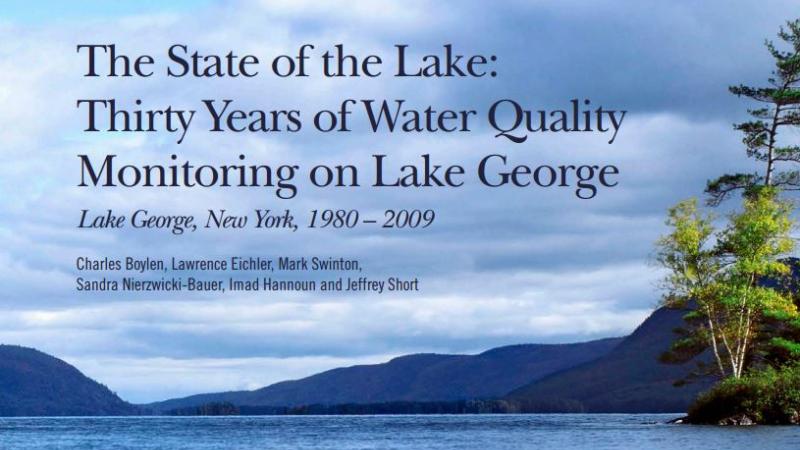August 15, 2014

A major new report—The State of the Lake: Thirty Years of Water Quality Monitoring on Lake George—was released today by the Rensselaer Polytechnic Institute Darrin Fresh Water Institute (DFWI) and The FUND for Lake George. The 72-page report is the result of 30 years of continuous monitoring that found Lake George to be in “remarkably good condition.” However, the report also outlines specific ecological factors that now threaten water quality. The full report can be downloaded at: fundforlakegeorge.org/StateoftheLake or rpi.edu/dept/DFWI/.
Over the 30-year period of the study, researchers found that “while some of the threats to Lake George water quality have receded since 1980, others are worsening.”
The report finds that some of the greatest threats to Lake George water quality include: rising concentrations of salt from continued applications to control winter road ice; the high sensitivity of the lake’s ecological health to even modest increases of nutrient loading (from storm water runoff, septic and sewage systems, fertilizers, and more); and changes in the lake’s food web and fish community in response to invasive species and other influences.
State of the Lake findings are the product of DFWI’s Offshore Chemical Monitoring Program that began collecting data in 1980 with sustaining support from The FUND for Lake George. The monitoring program was designed to assess water quality in order to help address concerns related to nutrient loading. It represents one of the longest and most consistent sets of lake chemistry data in North America, providing a valuable benchmark for long-term change in temperate lakes worldwide.
“Publication of The State of the Lake has been more than 30 years in the making and marks a major milestone for Lake George,” said Dr. Sandra Nierzwicki-Bauer, director of DFWI and a co-author of the study. “Extensive analysis of the lake’s water chemistry offers crucial new insights into the health of Lake George, and identifies important scientific questions that should now be studied,” said Nierzwicki-Bauer.
“The State of the Lake serves as spotlight and springboard for the new generation of strategic research now needed to realize breakthrough lake protection measures,” said Eric Siy, executive director of The FUND for Lake George. “With completion of The State of the Lake, the torch is now passed to The Jefferson Project at Lake George, our historic collaboration with Rensselaer andIBM, dedicated to the fate of the lake and establishing Lake George as ‘the global model for sustained ecosystem understanding and protection,’” Siy said.
The partnership between Rensselaer Polytechnic Institute and The FUND for Lake George continues, with the addition of IBM as a third partner, in The Jefferson Project at Lake George, that began in 2013. The project combines advanced data analytics, computing and data visualization techniques, new scientific and experimental methods, 3-D computer modeling and simulation, and historical data to gain an unprecedented scientific understanding of Lake George.
State of the Lake recommendations are already guiding The Jefferson Project by building upon the monitoring program to fully understand the lake. “Based atDFWI, The Jefferson Project will generate massive amounts of data about Lake George that will inform and compel decision-making that leads to lasting protection of the lake,” said Nierzwicki-Bauer. “The knowledge we will gain about the lake will not only advance the state of science and the practice of ecosystem management to create the global model for environmental research and sustainable water resources, it will also be critical to the region and New York state’s tourism industry.”
About Rensselaer/DFWI
Rensselaer Polytechnic Institute, founded in 1824, is the nation’s oldest technological research university. Institute programs serve undergraduates, graduate students, and working professionals around the world. The Institute is well known for its success in the transfer of technology from the laboratory to the marketplace so that new discoveries and inventions benefit human life, protect the environment, and strengthen economic development.
The Darrin Fresh Water Institute (DFWI) is a multidisciplinary environmental research center on Lake George dedicated to understanding the structure and function of aquatic, terrestrial, and atmospheric systems. During the 1970s, David M. Darrin '40 established the first of various endowments to DFWI. In the 1980s, the Darrin family provided funding to purchase a new site for DFWI at Bolton Landing. The primary research focus of DFWI is the ecological consequences of environmental perturbations due to human activities in the Northeastern United States. For more information on DFWI, see www.rpi.edu/dept/DFWI/.
About The Fund for Lake George
The FUND for Lake George is a privately funded not-for-profit organization dedicated to the protection of Lake George. Formed in 1980, the FUND applies a science-based approach to protection focused on Lake George water quality and the overall health of the Lake George watershed. The FUND pursues this mission through support of long-term scientific research, direct advocacy, and strategic partnerships with diverse public and private interests. Mounting threats to the water quality and natural character of Lake George, as revealed by latest research, compelled The FUND to launch its Legacy Strategy in 2013, with one driving goal: stopping the present decline of water quality and achieving sustained protection of Lake George for the next generation. The Legacy Strategy embraces environmental and economic imperatives as required to fulfill this goal. For more on the FUND’s work, see fundforlakegeorge.org.